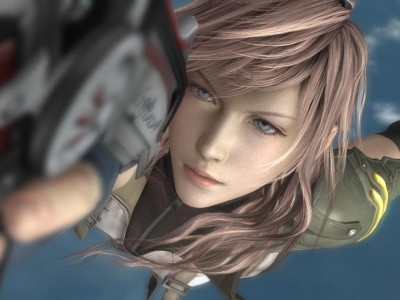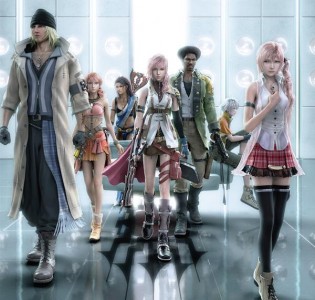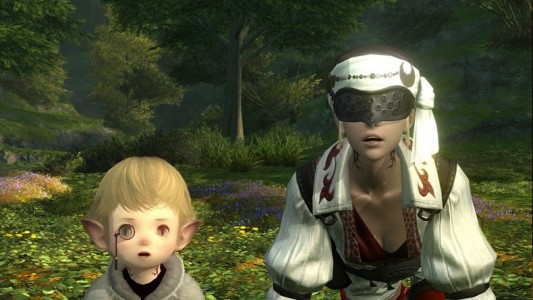FINAL FANTASY XIII: A SERIES OF MISTAKES
Let?s take a quick stroll down history lane, and flashback to E3 of 2006. Final Fantasy XIII is revealed via a minute and a half trailer depicting the game?s heroine, Lightning. If nothing else, Square Enix knows how to throw together a pretty damn good trailer, right? In this initial video the pink haired, all business Lightning bounds around the screen, firing rounds out of what looks to be a Gunblade, echoing back to a familiar FF weapon taken from another popular entry, Final Fantasy VIII.
2007 comes and goes, but at E3 2008 Square Enix drops a pretty big bomb, and announces that Final Fantasy XIII will go multi-platform for its release in North America. It?s the first game in the series to be non-exclusive, and that particular announcement definitely ignites a fire that?s an almost equal mix of fan vitriol and praise across the internet. Assuming you had the sense to take a step back and weren?t involved in console war nonsense, you probably got a good laugh out of a few reactions to that bit of news. But this announcement was certainly big for a variety of reasons, and it paved the way for the possibility of this being one of the best-selling entries in the series, simply because nearly every HD console owner would now have the opportunity to play it.

And again, that trailer was no slouch in the hype department. Lightning reappears, along with Snow, Vanille, and a number of familiar summons like Ifrit, Shiva and Carbuncle. You also get a glimpse at a more refined UI, and how some of the real-time combat will play out. It clocked in at a little more than two and a half minutes, and again got that E3 crowd hyped for the next Final Fantasy, appropriately so.
And then, in December of 2009, the game was released in Japan. The western release date wasn?t much later, arriving here in March of 2010. But in that three months or so, the fan backlash had already begun.
Early concerns about linearity in the dungeon design began surface. Images of the in-game map started to make their rounds across the ?net, and quickly became a joke among numerous forum posters, showcasing a single hallway surrounded by acres of black space, but still highlighting icons like treasure spheres and save points shoved to the left or right side of said hall. People joked about the need for any map, and quickly detractors began to announce the demise of Final Fantasy as a powerhouse RPG brand.
But for fans of the series that?s nothing new. Final Fantasy XII received its own brand of hate regarding the Gambit system, with a lot of internet ?trolls? quickly assumed that the game now would play itself. Of course there was a certain amount of autonomy present in that battle system, but people who actually played the game came to find that the system contained quite a bit of depth. So there was still hope, here on the western side of the world, that the early negative vibe surrounding FFXIII was another round of the same false assumptions. And to a certain degree they were right.
But not as much as they might have hoped. When the game arrived in March of 2010 I was just as eager to jump into the game as everyone else. I had my copy preordered, along with the LE Piggyback guide at my local GameStop. I even dragged my soon to be wife out to the midnight opening, and was pretty satisfied to see that there was a decent turnout of fans present for the release. I still had to work the next day, but was looking forward to at least plugging in a couple hours before I had to crash for the night, anticipating the coming weekend to marathon through the game.

And a couple hours is almost all it took to switch me from full on hype mode to being totally lukewarm on Final Fantasy XIII. I powered off my PS3 and thought, well, it?s bound to get better, right? So the weekend came and I put more into it, slowly padding out my party with characters like Vanille, Sazh, and Hope. But still the game failed to grab me. The most disheartening aspect was definitely the linearity. The lack of towns, the lack of any real NPC interaction. A crafting system that made little sense early on, because the game fails to explain it until you?ve already amassed a ridiculous number of materials. The only things I found myself enjoying were the new combat system, which was certainly pretty awesome, and the outstanding visuals that accompanied it. But even the battle system wore thin as I slugged it out with Behemoths and techno-infused robots that became hard to differentiate between one another.
And then there was the awful terms surrounding the different factions and groups that made the plot harder to follow than necessary. The fal?Cie, the l?Cie, Cie?th, and all the apostrophe marks Square Enix continually tossed my way insured that I was quickly losing sight of the plot. And the more disheartening aspect of that was that I found myself not caring. I?m pretty big on story driven games, and coming out of the excellent narrative surrounding Final Fantasy XII, I found a lot of the plot surrounding Final Fantasy XIII?s tale to be pretty awful.
Another issue I had was with the cast, which certainly doesn?t endear you to them early on. I liked Lightning well enough, and Sazh was a better character than his design would have led you to believe. But I found the whole Hope/Snow conflict to be a literal blight on the game every time it came into focus. And while Vanille certainly tried her best to be the charming, upbeat character she was clearly meant to be, she seems so out of place in the first 10 hours of the game that her constant optimism is almost jarring. It?s not until she starts to develop, and her backstory begins to unfold, that I began to enjoy her character. Fang, one of the best cast members, comes into the story far too late, like most of the good aspects in XIII.
So after that first weekend I put the game down, and didn?t pick it back up for quite a while. In fact, I?m pretty sure I sold it without finishing it, and it wasn?t until months later when the price started to drop to that $30 mark that I picked it back up, determined to give it another shot. The funny part of that is I had quit the game about a chapter before the whole Gran Pulse section opened up. And I think taking that long break from the game was the only thing that allowed me to enjoy it enough to finish. I have a feeling that if I powered through it originally, I?d be far more soured on the game than I already am.

Square Enix responded to critic and fan backlash in an interesting manner. And that was by freely admitting that the game had one hell of a tumultuous development cycle. Most fans and members of the press had assumed the game had some troubles; after all it was the longest development cycle of any Final Fantasy game yet. A lot of us assumed that was due to the hardware, many developers had noted that the PS3 was a tough platform to get accustomed to, and the fact that Square Enix had created an entire engine dubbed Crystal Tools to be introduced with this title left most of us thinking there were some kinks that had to be ironed out. But I don?t think a lot of us were aware of just how much trouble there was over the course of its five years in development.
After the release, details started to come out about a clash in design with the various teams that had worked on the game. The ?06 trailer shown at E3 was essentially the same as the Final Fantasy VII PS3 tech demo that had preceded it, with no real content underneath all that pretty, pretty CG. That?s hardly surprising, but after the positive reception to the trailer, the development team was put to work at hammering out exactly how the battle system of FFXIII would come together.
There was a push to design the battles after those found in the CG film Advent Children, but development was slowed by a number of factors. Reportedly members of a team working on Final Fantasy XIII Versus (hey, remember that?) were pitching in with the core team of FFXIII, and essentially it sounds like maybe there were too many hands in the pot. Not only that but the actual Crystal Tools engine was still in development, so a lot of work was in place just to get that up and running. So stalemates were hit at different points when one side of the development wasn?t ready for the other.
Up to the point where the demo was released with Advent Children Complete, the development team was at odds on the direction the game was headed. It was until they were forced to get the demo out in time for the film?s release that they were finally able to settle on exactly what the game would be. A lot of this information can be found in the October 2010 issue of Game Developer magazine, which makes for a pretty interesting read. I?m glossing over things a bit here, but if you have the opportunity to pick that up, it?s worth hunting down.
And that was a unique reveal from a Japanese developer. In general Japanese development is fairly private, with only a handful of outspoken designers like Itagaki and Inafune breaking from the habit of towing the company line. It certainly helped to explain why the game felt a little at odds with itself, featuring such a confined and restricted first half in comparison to the more open and appealing Gran Pulse locales.
Also worth mentioning is the departure of a number of employees over the course of the development, like battle director Toshiro Tsuchida. Tsuchida had been battle director for Final Fantasy X and participated in the development of Final Fantasy XI, before ending his career with Square Enix after the release of Final Fantasy XIII. Other parties switched to freelance roles, like composer Masashi Hamauzu, who is actually returning for the soundtrack of Final Fantasy XIII-2.

The doom and gloom of the Final Fantasy brand didn?t rest solely on the shoulders of Final Fantasy XIII though. Final Fantasy XIV, announced in 2009 and released in late 2010 was sort of a mess. And still is, but with Square Enix making a number of things now to do right by the folks interested in what was meant to be the MMO replacement for Final Fantasy XI. But altogether, 2010 wasn?t exactly a banner year for all things Final Fantasy. On a positive note the sales numbers for Final Fantasy XIII were extremely strong, selling 1.9 million copies by the end of 2009 in Japan, and selling more than a million in its first month in North America. Square Enix announced it as the fastest selling title in the franchise?s long history, no doubt due to the multi-platform strategy it adopted. But, as the year continued, more and more fans became vocal in their dislike of the game, and it was clear that Final Fantasy was losing a bit of traction in the west with both fans, and critics.




